Counterfeit and Replica Goods Laws in Scotland
What is the Legal Status of Replica Products in Scotland?
In Scotland, the legal status of replica products is strictly regulated. These products are considered illegal if they are being sold as genuine articles without the permission of the brand owner. The Trade Marks Act 1994 is the primary legislation in Scotland that addresses this issue.
However, it’s important to note that replica items themselves are not illegal if they are clearly identified as such and do not infringe on the intellectual property rights of the original brand.
What are the Laws, Penalties and Law Enforcement Protocols for Counterfeit Products in Scotland?
The laws against counterfeit products in Scotland are strict. Counterfeit goods are addressed under both The Trade Marks Act 1994 and The Copyright, Designs and Patents Act 1988. These laws protect brands and consumers from the deceptive practices associated with counterfeit goods.
The penalties for selling counterfeit goods can be severe. The maximum penalty upon conviction in a magistrates’ court is six months’ imprisonment and/or an unlimited fine. If the case is more serious and is tried in a Crown Court, the maximum penalty can be up to ten years’ imprisonment and/or an unlimited fine.
Law enforcement protocols for counterfeit products involve the police, Trading Standards, and in some cases, brand representatives. Raids, seizures, and prosecutions are common in the fight against counterfeit goods.
What is the Current List of Regulations for Counterfeit Goods in Scotland?
Counterfeit goods in Scotland are regulated under the following key legislations:
- The Trade Marks Act 1994: This protects registered trademarks and punishes those who counterfeit them.
- The Copyright, Designs and Patents Act 1988: This covers the copyright protection of products, including their design and packaging.
- The Consumer Protection from Unfair Trading Regulations 2008: This protects consumers from deceptive business practices, including the sale of counterfeit goods.
How Does the Replica Watch Market Operate in Scotland?
The replica watch market in Scotland, like in many other parts of the world, operates mainly through online platforms. These include standalone websites, social media platforms, and online marketplaces. Brands like Rolex and Omega are popular targets for counterfeiters due to their high value and consumer demand.
However, it’s important to note that buying, selling, or even possessing counterfeit watches is illegal in Scotland. The penalties can be severe, especially if the counterfeit goods are being sold on a large scale.
Where Can the Replica Clothes or Watches be Obtained in Scotland?
Replica clothes and watches can often be found on online marketplaces, social media platforms, and in some physical markets. However, consumers should be wary of the legality and ethics of buying these products. Purchasing counterfeit goods, such as a fake Gucci handbag or Rolex watch, is illegal and contributes to a number of societal issues, including poor working conditions and loss of tax revenue.
What Government Laws, Resources and Links are Available Pertaining to Counterfeit and Replica Goods in Scotland?
There are numerous government resources available to help consumers and businesses understand the laws and consequences of counterfeit and replica goods in Scotland. These include:
- Trading Standards Scotland: This is a public body that provides information and advice on consumer rights and issues, including counterfeit goods. Visit the Trading Standards Scotland website here.
- Police Scotland: The police force in Scotland actively enforces laws against counterfeit goods and provides advice on how to report suspected counterfeit goods. Visit the Police Scotland website here.
- The Intellectual Property Office: This government body provides information on intellectual property rights, including the laws and penalties for counterfeit goods. Visit the Intellectual Property Office website here.
While it's clear that all the legal repercussions are on the seller, the buyer should make sure to find a trusted dealer, since there is a lot of scam in the replica industry. If you are in the market for Replica Rolex watches, make sure you choose a trusted and reputable vendor.For the best Replica Gucci Handbags and clothing, you should check Luxury Mall.
